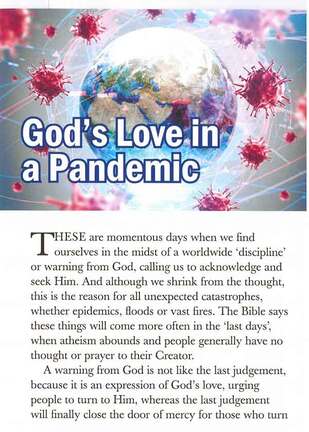 Click to enlarge
Click to enlarge The Spurgeon Metropolitan Baptist Tabernacle dominates London's Elephant & Castle. It is said to draw a large crowd.
They kindly dropped an explanatory note through my letterbox this week. It's about this C19 pandemic thing. Apparently its from God:
"THESE are momentous days when we find ourselves in the midst of a worldwide 'discipline' or warning from God, calling us to acknowledge and seek Him. And although we shrink from the thought, this is the reason for all unexpected catastrophes, whether epidemics, floods or vast fires. The Bible says these things will come more often in the 'last days', when atheism abounds and people generally have no thought or prayer to their Creator. A warning from God is not like the last judgement, because it is an expression of God's love, urging people to turn to Him, whereas the last judgement will finally close the door of mercy...."
I've heard this line of Christian thinking many times before. Who hasn't? It is easy to make fun of it because it is in fact rather silly. For those susceptible to this kind of distorted theology it is also rather dangerous: it can do harm.
It's hard to know where to start. First, such a framework simply does not fit within my faith-as-a-working-hypothesis-to-live-by understanding of the Christian God. Not even a bit. God, we are told, is love and such love is not reflected in endless, subtle, multiform 'disciplining'. Love has better methods at its disposal. Second, such a view paints God as a rather poor communicator, doesn't it? If "all unexpected catastrophes, whether epidemics, floods or vast fires" are warning from God intended to 'discipline us' its a bit of a scatter-gun approach. Can't God do better?
Those who elevate the entire canon of scripture into a coherent, God-dictated set of certain facts and instructions naturally approve of this kind of disciplinarian interpretation. Those who are drawn into the mystery of God as made known in and through the short life of the Nazarene and who seek understanding from a canvas far wider than the words of scripture (human experience and understanding, the material unearthed by an adventurous and curious life, reason, beauty) will see it for what it is: a narrow theology of sin and salvation free of wisdom and heart.
They kindly dropped an explanatory note through my letterbox this week. It's about this C19 pandemic thing. Apparently its from God:
"THESE are momentous days when we find ourselves in the midst of a worldwide 'discipline' or warning from God, calling us to acknowledge and seek Him. And although we shrink from the thought, this is the reason for all unexpected catastrophes, whether epidemics, floods or vast fires. The Bible says these things will come more often in the 'last days', when atheism abounds and people generally have no thought or prayer to their Creator. A warning from God is not like the last judgement, because it is an expression of God's love, urging people to turn to Him, whereas the last judgement will finally close the door of mercy...."
I've heard this line of Christian thinking many times before. Who hasn't? It is easy to make fun of it because it is in fact rather silly. For those susceptible to this kind of distorted theology it is also rather dangerous: it can do harm.
It's hard to know where to start. First, such a framework simply does not fit within my faith-as-a-working-hypothesis-to-live-by understanding of the Christian God. Not even a bit. God, we are told, is love and such love is not reflected in endless, subtle, multiform 'disciplining'. Love has better methods at its disposal. Second, such a view paints God as a rather poor communicator, doesn't it? If "all unexpected catastrophes, whether epidemics, floods or vast fires" are warning from God intended to 'discipline us' its a bit of a scatter-gun approach. Can't God do better?
Those who elevate the entire canon of scripture into a coherent, God-dictated set of certain facts and instructions naturally approve of this kind of disciplinarian interpretation. Those who are drawn into the mystery of God as made known in and through the short life of the Nazarene and who seek understanding from a canvas far wider than the words of scripture (human experience and understanding, the material unearthed by an adventurous and curious life, reason, beauty) will see it for what it is: a narrow theology of sin and salvation free of wisdom and heart.